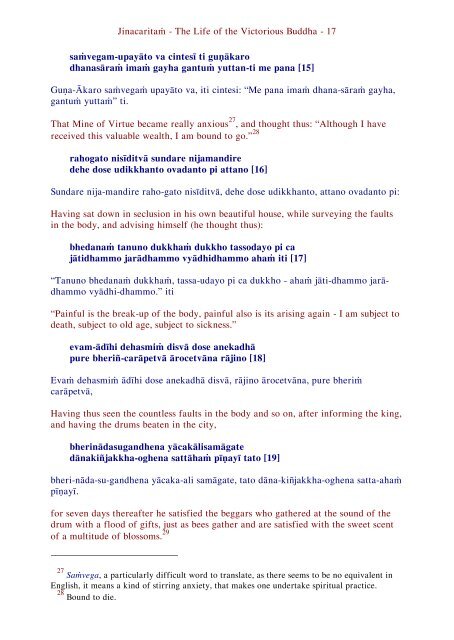Jinacaritaṁ: The Life of the Victorious Buddha
A Pāli and English line by line (interlinear) version of this Medieval verse biography of the Buddha from his Bodhisatta aspiration to the founding of the Jetavana monastery (together with extensive annotation).
A Pāli and English line by line (interlinear) version of this Medieval verse biography of the Buddha from his Bodhisatta aspiration to the founding of the Jetavana monastery (together with extensive annotation).
Create successful ePaper yourself
Turn your PDF publications into a flip-book with our unique Google optimized e-Paper software.
<strong>Jinacaritaṁ</strong> - <strong>The</strong> <strong>Life</strong> <strong>of</strong> <strong>the</strong> <strong>Victorious</strong> <strong>Buddha</strong> - 17<br />
saṁvegam-upayāto va cintesī ti guṇākaro<br />
dhanasāraṁ imaṁ gayha gantuṁ yuttan-ti me pana [15]<br />
Guṇa-Ākaro saṁvegaṁ upayāto va, iti cintesi: “Me pana imaṁ dhana-sāraṁ gayha,<br />
gantuṁ yuttaṁ” ti.<br />
That Mine <strong>of</strong> Virtue became really anxious 27 , and thought thus: “Although I have<br />
received this valuable wealth, I am bound to go.” 28<br />
rahogato nisīditvā sundare nijamandire<br />
dehe dose udikkhanto ovadanto pi attano [16]<br />
Sundare nija-mandire raho-gato nisīditvā, dehe dose udikkhanto, attano ovadanto pi:<br />
Having sat down in seclusion in his own beautiful house, while surveying <strong>the</strong> faults<br />
in <strong>the</strong> body, and advising himself (he thought thus):<br />
bhedanaṁ tanuno dukkhaṁ dukkho tassodayo pi ca<br />
jātidhammo jarādhammo vyādhidhammo ahaṁ iti [17]<br />
“Tanuno bhedanaṁ dukkhaṁ, tassa-udayo pi ca dukkho - ahaṁ jāti-dhammo jarādhammo<br />
vyādhi-dhammo.” iti<br />
“Painful is <strong>the</strong> break-up <strong>of</strong> <strong>the</strong> body, painful also is its arising again - I am subject to<br />
death, subject to old age, subject to sickness.”<br />
evam-ādīhi dehasmiṁ disvā dose anekadhā<br />
pure bheriñ-carāpetvā ārocetvāna rājino [18]<br />
Evaṁ dehasmiṁ ādīhi dose anekadhā disvā, rājino ārocetvāna, pure bheriṁ<br />
carāpetvā,<br />
Having thus seen <strong>the</strong> countless faults in <strong>the</strong> body and so on, after informing <strong>the</strong> king,<br />
and having <strong>the</strong> drums beaten in <strong>the</strong> city,<br />
bherinādasugandhena yācakālisamāgate<br />
dānakiñjakkha-oghena sattāhaṁ pīṇayī tato [19]<br />
bheri-nāda-su-gandhena yācaka-ali samāgate, tato dāna-kiñjakkha-oghena satta-ahaṁ<br />
pīṇayī.<br />
for seven days <strong>the</strong>reafter he satisfied <strong>the</strong> beggars who ga<strong>the</strong>red at <strong>the</strong> sound <strong>of</strong> <strong>the</strong><br />
drum with a flood <strong>of</strong> gifts, just as bees ga<strong>the</strong>r and are satisfied with <strong>the</strong> sweet scent<br />
<strong>of</strong> a multitude <strong>of</strong> blossoms. 29<br />
27 Saṁvega, a particularly difficult word to translate, as <strong>the</strong>re seems to be no equivalent in<br />
English, it means a kind <strong>of</strong> stirring anxiety, that makes one undertake spiritual practice.<br />
28 Bound to die.


















